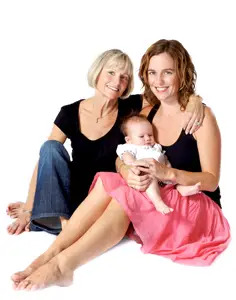About 25 percent of full-time working moms with children under the age of 5 have a grandparent caring for their children. While convenient, this arrangement is not without its complications. Author Julie Revelant explores the ramifications this relationship raises and how it’s affected by generational changes in child raising.
 Since her son, Zachary, was 6 months old, Lori Schroeter of Queens has depended on her mother, Gina, to care for him while she works full-time in fundraising. Lori is divorced and says she can’t afford a nanny or full-time day care, so her mom has Zachary, now 2, part-time each week. Lori even sold her house on Long Island so they would be closer, and one of the reasons Gina retired was so that she could take care of Zachary. “Even if I won the lottery, she would be very upset if I took her time away from him,” Lori says.
Since her son, Zachary, was 6 months old, Lori Schroeter of Queens has depended on her mother, Gina, to care for him while she works full-time in fundraising. Lori is divorced and says she can’t afford a nanny or full-time day care, so her mom has Zachary, now 2, part-time each week. Lori even sold her house on Long Island so they would be closer, and one of the reasons Gina retired was so that she could take care of Zachary. “Even if I won the lottery, she would be very upset if I took her time away from him,” Lori says.
For Lori and many working moms like her, this arrangement, while essential, is not always perfect. When Gina started to care for Zachary, Lori made it very clear that she didn’t want him to watch any television before he was 2, a decision based on recommendations from the American Academy of Pediatrics. Gina decided, however, that when she was with Zachary, TV time was okay. Lori tried to explain her reasoning and even emailed her articles, but Gina continued to let him watch TV and video clips on her computer. “One of the things she loves about being with kids is that she likes Sesame Street because it’s educational and she doesn’t see anything wrong with it.” Lori says that ultimately she had to choose her battles. “I stopped fighting it because he turned 2 and I decided that as long as it’s only a certain amount of time a day, I’ll live with it.”
 Raising Children Has Changed
Raising Children Has Changed
In 2006, the U.S. Census Bureau estimated that 25 percent of full-time working moms with children under the age of 5 have a grandparent caring for their children. In the decades since these grandparents were parents, however, the guidelines for raising happy, healthy children have dramatically changed. Grandparents may have looked to Dr. Benjamin Spock’s Baby and Child Care, or Penelope Leach’s Your Baby and Child for answers. Today’s moms get their information from a variety of sources (see Mom’s Top 10 Most Trusted Sources of Information). “In grandma’s time, mothers were much more individualistic in how they raised their children,” notes Dr. Judith Goldstein, Diplomate of the American Academy of Pediatrics and Clinical Assistant Professor of Pediatrics at Mount Sinai School of Medicine and Cornell-Weill Medical Center in Manhattan. Dr. Goldstein points to the lack of parenting groups and classes that today give mothers straightforward, proven approaches for raising children.
It’s Complicated
Unlike the relationship between mothers and sons, the intense connection often seen between mothers and daughters can make the relationship with grandchildren even more complicated. “Grandmothers see themselves in their daughters and they tend to relive their days of raising children,” says Dr. Leon Hoffman, Codirector of the Pacella Parent Child Center in Manhattan. And he adds that many first time moms need the message that they too can be a mother. “A large number of new mothers really want and need some kind of validation from their mothers,” he says. “Sometimes the conflict becomes a symbol of problems in other parts of the relationship,” observes Dr. Robin F. Goodman, a licensed clinical psychologist in Manhattan. Dr. Goodman says that issues of control and competition are usually behind the conflict. Particularly for first time moms who are developing their own parenting styles, the relationship can be further challenged by their opinions about their own childhoods. “Grandparents feel that they have the experience, but mothers and daughters may disagree about how successful that original parenting was,” she says.
When Special Needs are Involved
For some moms, like Abby Lester of Riverdale, having a child with special needs can often make the situation more stressful. Lester’s son, Casey, now 1 year old, came home from the hospital when he was four and half months old with a variety of health problems. Casey required special care and he was attached to machines that administered oxygen 24 hours a day and monitored his heart rate and oxygen levels. Abby’s mom, Bonnie, who cares for Casey part-time each week while she works as an archivist, was nervous when she had to pick him up or move him and when the numbers weren’t perfect. She also feared that the machines would stop working. Abby and her husband worried about Bonnie handling Casey’s unique set of health challenges and wondered if the arrangement would even work.
|
New Moms’ Advice Favorites What to Expect the First Year by Heidi Murkoff, Sandee Hathaway, and Arlene Eisenberg The Happiest Baby on the Block: The New Way to Calm Crying and Help Your Newborn Baby Sleep Longer by Harvey Karp Baby 411: Clear Answers & Smart Advice For Your Baby’s First Year by Denise Fields and Ari Brown |
Although Bonnie eventually became more comfortable caring for Casey, she and Abby started to disagree about other issues. Since Casey wasn’t used to being held a lot in the hospital, Abby didn’t want to over stimulate him, so she would let him fall asleep on the Boppy® pillow. Yet when Bonnie was with Casey, she insisted that he be held constantly and would never let him “cry it out.” Although Bonnie disagreed, Abby says that setting boundaries was the key to resolving their disagreements. “She can do certain things when she’s with him and I’m not around as long as she has his best interests at heart.”
Abby says that one of the biggest conflicts they have today is that her mom is overbearing. When they talk about it, Bonnie says, “I did that with you and you turned out fine,” or “I wouldn’t be a grandmother if I didn’t do that.” Abby will tell her that she was actually annoyed by this behavior, particularly as she got older. “She always wants to hold him, hug him, and kiss him; we do a lot of that too, but we like to give him time to explore toys and play,” she says. Abby has also thrown out teethers that Bonnie bought for Casey if they weren’t made of BPA-free plastic. “It’s a symbiotic relationship in that she wants to be able to spend this time with Casey and we need her, but I still feel very strongly that he’s my son and he’s going to be raised the way I want him to be raised.”
Handling Different Stages
Bridget Mary McNamee of Mt. Kisco works as a clinical study coordinator and was only able to return to work because her mom, Sheila, cares for her 2-year-old daughter, Tara. Bridget says that sometimes Sheila thinks that what worked for her when she raised children will also work for Tara. A few months ago, Tara started to tell Sheila that her diaper was wet or that she needed to be changed, so Sheila decided that not only should she be potty trained but that it should be done that day, and bought her regular underwear to wear. Bridget knew from articles she had read that there would be other indications that Tara was ready and explained to her mom that she didn’t want the process to backfire. Yet Sheila thought that since Bridget had been potty trained by the time she was 2 years old, Tara was ready as well. After a few accidents, however, Sheila decided to put her back in diapers. “At first she listened, but maybe she decided that I didn’t know what I was talking about until she realized it wasn’t working,” Bridget says.
As Tara becomes more independent and defiant, Bridget hopes her mom will exercise more discipline. Sheila isn’t strict with Tara-when she throws tantrums and says, “No, Nana,” Sheila thinks it’s funny and laughs. “I don’t want Tara to think when she’s with her grandmother she can do whatever she wants and it’s going to be funny,” Bridget says. Although she has asked Sheila to try to be stricter with Tara and maybe even put her in a time-out, she doesn’t think her mom has followed through. “I really want to lay a foundation of discipline and so I have talked to her about it recently because I want to make sure we’re on the same page,” Bridget says.
Choose Your Battles
Adele Arkin of Long Beach, an instructor and owner of Stroller Strides, relies on her husband’s parents to care for her 3-year-old daughter who has rheumatoid arthritis. Since her medication lowers her immune system, it’s important that she eat all of her meals and that they be healthy ones. So when her in-laws fed her daughter chicken nuggets and French fries, Adele had to intervene. “I explained that it’s important that her immune system stay strong and in order to do that, we need to make sure that she eats, and eats well.” Adele gave them suggestions for appropriate restaurants and meal choices. “It was easier to sell it as ‘this is important for her health’ as opposed to just whats need,” she says.
Adele and her in-laws also disagree on the way that Adele leaves and says good-bye to her daughter. They think that the healthy way is for Adele to tell her daughter she’s leaving and that she’ll be back. So far, this approach has proved unsuccessful and her daughter is left crying and upset. So Adele has asked her in-laws to have an activity ready to distract her while Adele quietly leaves. Although they still disagree about it, Adele hopes she’ll eventually be able to say good-bye without upsetting her daughter. “I have told them that I didn’t know if we would be able to agree on this issue, but that I felt that what I’m doing is what’s best for her.”
|
Mom’s Top 10
Most Trusted Sources of Information
1. Pediatricians 2. Friends and family 3. Evening news 4. Internet searches 5. Physician’s office 6. Web sites 7. Parenting books 8. Morning TV talk shows 9. Newspaper articles 10. Magazine articles Source: Bailey, M. (2008, September 18). New survey reveals moms’ media habits. Marketing to Moms Coalition and Current Lifestyle Marketing. (Non-peer reviewed research report) |
Grandparents aren’t hired nannies, and because the family dynamic is what makes this arrangement unlike any other type of childcare, there will inevitably be some conflict. “These conflicts come down to ‘my way is better than your way’ and that has to be avoided,” says Dr. Hoffman, who warns parents not to have these discussions in front of the child because the message gets communicated very early on. Finding ways to navigate the issues and compromise can truly make or break the relationship. According to Dr. Goodman, moms should choose their battles and be open to what the grandparents’ opinions are. Regardless of who’s right, the appropriate decisions should be made based on what’s in the best interest of the child.
Dr. Goodman also says that making the distinction between what’s territorial and what’s theoretical is key as well. So, for example, moms may decide that it’s acceptable if certain rules apply when the child is with the grandparent, but if the child acts out or is unable to make the transition between both routines, it’s best to be consistent. At other times, there are issues that mothers refuse to compromise on and they must be confident and assert their roles as moms. “If there is something that you feel really strongly about, you need to decide that it’s one area that is a deal breaker for you,” she advises. Also, instead of just telling the grandparent what you want, give her articles you’ve read or tangible evidence like product labels. And encourage grandparents to do activities that they’re good at. “The more you include them in some of the decision making and thought processes, it helps them feel that they’re not just staff, but really a part of the family.”
Since it is the moms who primarily consult pediatricians, their information is much more up to date and consistent with current research. Because of this, Dr. Goldstein says that moms should be the ones to establish how their children will be raised and their parameters should be clearly explained to the grandparents. And with grandparents today being generally healthier and much more involved, she says it can be helpful for them to educate themselves too. “There are so many classes on childcare and it would be a shame for grandparents not to make themselves available to keep up with the trends.”
Despite the many challenges that may arise when grandparents take on the role of childcare provider, all these moms are grateful and wouldn’t want it any other way. “You can’t ask for a safer situation; I know if there’s a problem, she’s going to call me at work and I know she’ll always have his best interests at heart,” says Abby. And the family bond is one that gets stronger every day. “It’s the biggest joy to see the relationship that’s being formed between my daughter and my in-laws,” Adele says.





















